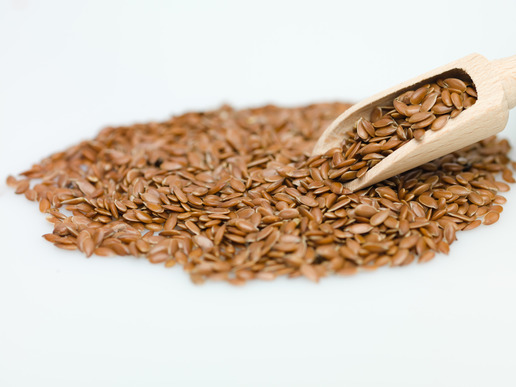Flaxseed is believed to have originated from Egypt, where they used it for nutritional and medicinal purposes. The powerful seeds were also treasured by the Roman Empire for its healing properties. In fact, flax was one of the original “medicines” used by Hippocrates.
Even Ghandi praised flax seeds, saying: Wherever flaxseed becomes a regular food item among the people, there will be better health.
~ Mahatma Gandhi
Although you may not see flaxseed highly advertised doesn’t mean that it’s not a healthy component of any diet. In fact, it is one of the best foods you can add to your daily food sources, packing lots of heart-healthy ingredients.
Components of FlaxSeed
Flaxseeds are highly nutritious with a subtle nutty flavor; they are slightly larger than sesame seeds and they range in color from deep amber to reddish brown, depending upon whether they are the golden or brown variety. Keep in mind that both varieties hold the same nutritional value.
This powerful food is packed with healthy essential oils, high-quality proteins, dietary fiber, antioxidants, vitamins and minerals. The four main components are fiber, protein, lignans, and alpha-linolenic acid. These four elements give flaxseed their nutritional punch.

What are the health benefits of flaxseed?
1. Contains precious Alpha-Linolenic Acid
Flaxseed oil contains a concentrated source of alpha linolenic acid (ALA), a plant-based fatty acid the body uses for energy. It is the precursor (or source substance) to omega 3 fatty acids. Alpha-linolenic acid is also an essential fatty acid found in flaxseed oil, canola oil and walnuts.
Omega-3 fatty acids are also a key force against inflammation in the body. Lots of research is now showing that inflammation plays a part in many chronic diseases including heart disease, arthritis, asthma, diabetes, sexual performance and even some cancers. Inflammation is enhanced when there is a deficiency of Omega-3 intake.
2. Lowers Cholesterol
Many studies have shown flaxseed to offer healthy heart benefits including lowering total cholesterol and low-density lipoprotein (LDL) cholesterol (the bad cholesterol) levels. This effect is true of all highly unsaturated oils.
According to Dr. Stephen Cunnane, it can lower the cholesterol of healthy people by 7%. In people with higher cholesterol, the benefit is even greater.
This lowered cholesterol helps reduce the risk of heart disease.
3. Reduces the Risk of Cancer
Flaxseed itself (ground or whole) contains lignans, which contains antioxidants which may help protect against certain cancers. Lignans are thought to lower cancer risk by blocking some effects of the estrogen your body naturally produces.
Dr. Johanna Budwig has performed extensive research on the link between flaxseed and cancer. She has been nominated for the Nobel Prize seven times. Johanna Budwig has used flaxseed oil successfully in cancer therapy in over 1,000 documented cases.
4. Makes your hair stronger
Flaxeeds are packed with necessary nutrients like zinc, magnesium, calcium and proteins for the grow of your hair. The high amount of omega 3 acids makes your hair stronger and more shiny. Its anti-inflammatory qualities helps to fight against hair loss, dandruff and other scalp conditions.
5. Natural Appetite Suppressant
The high fiber content found in flaxseed makes it a natural appetite suppressant, making you feel full and satisfied. Anyone wanting to manage or lose weight would be smart to start incorporating flaxseed into their daily diet.
Flaxseed also increases your metabolic rate, which increases the efficiency of cellular energy production. All of these components help fight against obesity.
6. Helps with Asthma
Flaxseed is great for those with asthma because of the magnesium, which helps to keep airways relaxed and open. Magnesium also lowers HGH blood pressure and reduces the risk of heart attack and stroke in people with atherosclerosis and diabetic heart disease.
7. Helps with Migraines
Have trouble with migraines? You might be happy to hear that the magnesium contained in flaxseeds helps prevent the blood vessel spasm that leads to migraine attacks. Magnesium also promotes relaxation and helps restore normal sleep patterns.
8. Increases your vitality and energy
For athletes and active people in general, flaxseed is a great source of energy and vitality. Flax seed increases your metabolic rate and cellular respiratory oxidation. Flaxseed can also help reduce body fat, which leads to a lean and active body.
Convinced to include flaxseed to your diet? Leave a comment below with thoughts on the article.


